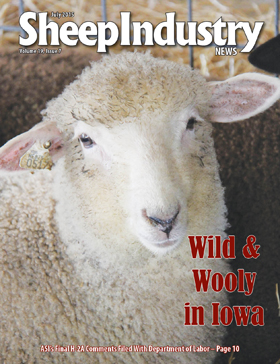
- July 2015
- President’s Notes
- H-2A Comments Come From Variety of Sources in Industry
- Iowa Gets Wild & Wooly at 11th Sheep & Wool Show
- Let’s Grow Grants Funded
- Market Report
- ASI Photo Contest
- Legislative News in Brief
- Trailing Festival Makes Plans
- Montana Program to Discuss Genetics
- ATHM Offers New Wool Exhibit
- Sheep News in Brief
- Wool News in Brief
- The Last Word
Wool News in Brief
Cabot Hosiery Announces Expansion
Sock-maker Cabot Hosiery Mills is about to start a major expansion project that will double the size of its plant and more than double the size of its workforce.
Ric Cabot, president and chief executive officer, says the Darn Tough sock brand has woven its way around the globe and to keep up with demand the company is growing.
Cabot Hosiery has knit socks in Northfield, Vt., since 1978. The company has grown over the years and now is about to begin its biggest expansion ever.
“We’re going to add 250 more jobs over the next two to four years and we want to stay in Vermont, obviously, we want to make it in Vermont,” said Cabot.
The brand name Darn Tough started more than 10 years ago when Cabot took over the business from his father. One of the main reasons behind the brand name, it’s darn tough to put a hole in them.
“I started Darn Tough in that year 2003, 2004, and we’ve been riding that growth ever since,” said Cabot.
Right now the sock makers have 188 employees. Cabot says 250 more jobs will be added over the next few years and the facility will double in size. – Reprinted in part from WCAX
Trumbull Attends IWTO Congress
David Trumbull, principal, Agathon Associates, was in Zhangjiagang, China, in May attending the 84th Congress of the International Wool Textile Organisation. ASI, Agathon’s client, sent him as a member of the eight-person U.S. delegation. Also in the American delegation were representatives of Agathon’s clients, Burlington Industries and The Brickle Group. The U.S. delegation included representatives of every stage of wool processing.
Trumbull co-lead a “coffee table discussion” on Super S labeling in the U.S. He explained how the U.S. Wool Production Label Act of 1939 provision relating to Super S labeling differs from the IWTO Code of Practice regarding Super S. Co-leader, Kenneth Shimizu of the Cashmere and Camel Hair Manufacturers Institute discussed the prospects for amending the law to make it closer to the IWTO Code.
Presenters discussed the growing consumer preference away from “fast fashion” (cheap clothing worn for a season and discarded) and toward higher quality, durable garments. The American wool textile industry’s positive story may present an opportunity for promoting American wool to this new type of consumer.
The final theme addressed was the need to move from commodity items to luxury. The discussion touched on moving to ever finer wools (Supers) and cashmere. – Textiles and Trade

